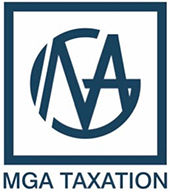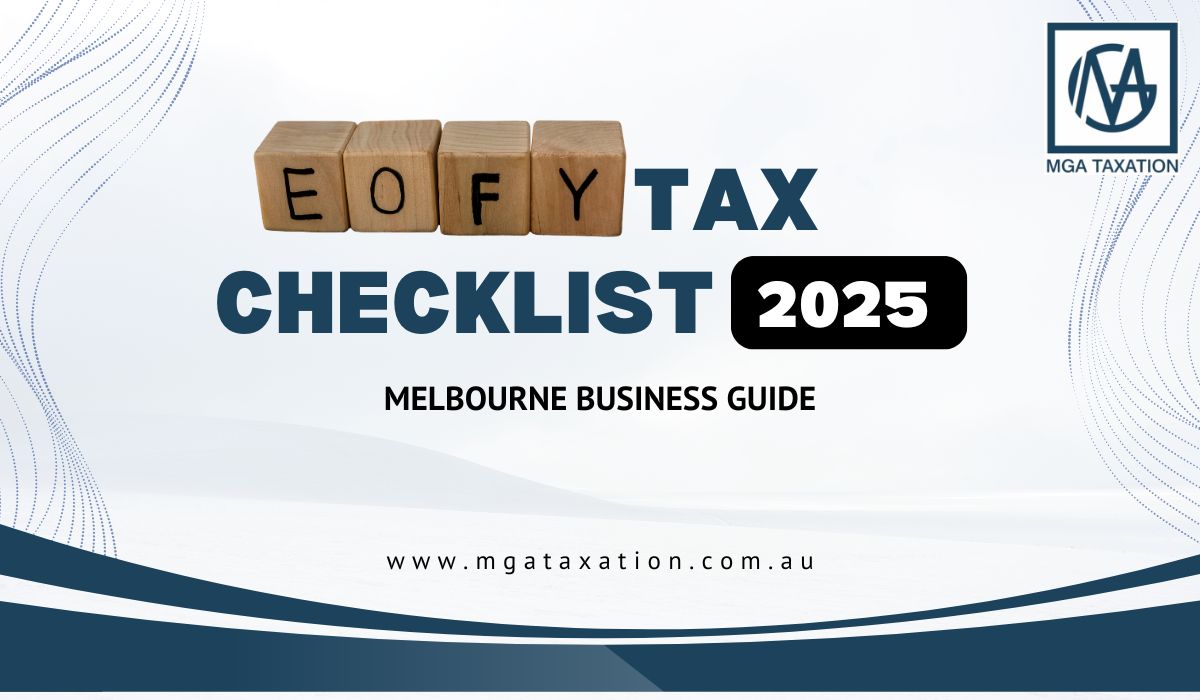As the end of the financial year (EOFY) on June 30th approaches, Melbourne businesses—from bustling cafes to innovative tech startups—need to get their financial ducks in a row. This isn’t just about compliance; it’s a golden opportunity to optimise your tax position, streamline operations, and set your business up for a strong financial year ahead.
Partnering with a trusted tax adviser can make all the difference. With expert guidance, you can uncover potential deductions, avoid costly errors, and make strategic financial decisions tailored to your business goals.
Here’s a comprehensive EOFY tax checklist to help Melbourne businesses navigate the upcoming tax season with confidence:
1. Reconcile and Organise Your Financial Records
This is the cornerstone of a smooth EOFY. Ensure all your financial records are accurate, complete, and readily accessible.
- Bank Accounts, Loans, and Credit Cards: Reconcile all transactions to catch any missing or duplicate entries.
- Invoices and Receipts: Ensure all sales invoices are issued and recorded, and all supplier invoices and receipts for business expenses are collected and categorised. This includes office supplies, equipment, travel, and home office expenses.
- Payroll Reports: If you have employees, finalise your payroll data, including gross wages, PAYG withholding, and superannuation payments.
- Accounts Receivable and Payable: Review and update records of all money owed to you and all bills you need to pay. Consider writing off any bad debts that are genuinely unrecoverable before June 30th.
- Inventory: For businesses holding stock, conduct a thorough stocktake and adjust quantities as needed. Consider writing off any obsolete, damaged, or unsellable stock.
2. Maximise Your Deductions
Don’t leave money on the table! Australia’s tax laws offer various deductions for businesses.
- Instant Asset Write-Off: For the income year ending 30 June 2025, small businesses (with aggregated turnover of less than $10 million) can immediately deduct the full cost of eligible assets costing less than $20,000. Crucially, this threshold is set to drop to $1,000 from 1 July 2025, so act now if you’re considering eligible asset purchases.
- Prepaid Expenses: If your business turnover is under $50 million, you can prepay eligible expenses for services covering 12 months or less (e.g., rent, insurance, subscriptions) and claim the deduction in the current financial year.
- Superannuation Contributions: To claim a tax deduction in the current financial year, ensure all employee superannuation contributions are paid and received by the super fund before 30 June 2025. Late payments are not deductible in the current year and may incur penalties.
- General Business Expenses: Don’t forget to claim legitimate deductions for:
- Advertising and marketing
- Legal and accounting fees
- Insurance
- Loan interest and bank fees
- Employee costs (wages, training, workers’ compensation)
- Premises costs (rent, maintenance, utilities)
- Office supplies and software subscriptions
- Business travel and vehicle expenses
- Digital costs (website hosting, domain registration, digital ads)
- Depreciation: For assets not eligible for instant asset write-off, claim depreciation over their effective life.
- Startup Costs: If you commenced business this financial year, remember to deduct eligible setup costs.
3. Review Your Superannuation Obligations
The Superannuation Guarantee (SG) rate is continually rising.
- Current Rate: For the 2024-2025 financial year, the SG rate is 11.5%.
- Upcoming Increase: From 1 July 2025, the SG rate will increase to 12%. Ensure your payroll systems are updated to reflect this change for all salary and wages paid on and after this date.
- Paid Parental Leave Superannuation Contribution: From 1 July 2025, superannuation will be paid on government-funded Paid Parental Leave.
4. Understand Key Tax Changes for 2024-2025
Staying informed about recent and upcoming tax changes is vital.
- ATO Interest Deductions Denied: From 1 July 2025, interest charges owed to the ATO (General Interest Charge and Shortfall Interest Charge) will no longer be tax-deductible. This makes timely tax payments even more crucial.
- Higher Penalties for Non-Compliance: The Commonwealth penalty unit value increased in November 2024, meaning higher penalties for late lodgements or payments.
- Victorian Payroll Tax Relief: The annual payroll tax-free threshold in Victoria increased to $900,000 from 1 July 2024, and will rise to $1,000,000 from 1 July 2025. This offers relief for growing businesses in Melbourne.
- Monthly GST Lodgements: From 1 April 2025, businesses with a history of poor compliance may be mandated to lodge GST monthly instead of quarterly.
- ABN Cancellation: The ATO has begun cancelling inactive or invalid ABNs. Ensure your business is actively reporting income.
5. Essential Lodgement Dates and Deadlines
While the EOFY is June 30th, various lodgement and payment deadlines extend throughout the coming months.
- Single Touch Payroll (STP) Finalisation: Employers must finalise STP data and submit income statements to the ATO by 14 July 2025.
- Quarterly BAS (April-June quarter): Due 28 July 2025. This also includes PAYG withholding and GST instalments.
- Superannuation Contributions (April-June quarter): Due 28 July 2025.
- Taxable Payments Annual Report (TPAR): If applicable (e.g., for businesses in building and construction, cleaning, courier services), due by 28 August 2025.
- Income Tax Returns:
- For individuals and sole traders lodging themselves: 31 October 2025.
- For companies lodging themselves: Generally, 28 February 2026 (check specific dates with the ATO or your tax agent).
- Using a Registered Tax Agent: Engaging a registered tax agent can extend your lodgement deadlines significantly, often well into the following year (e.g., 15 May 2026 for individuals and partnerships who lodge with an agent).
6. Review Your Business Structure and Plan for the Future
EOFY is an excellent time for a strategic review.
- Business Structure: Is your current business structure (sole trader, partnership, company, trust) still the most tax-efficient and appropriate for your growth plans and asset protection needs? Discuss this with your accountant.
- Cash Flow and Budgeting: Analyse your financial performance from the past year, compare it to previous years, and set financial performance targets and budgets for the upcoming FY2025- 2026.
- Insurance Review: Ensure your business insurance policies are adequate and up-to-date.
- Accounting Software: Ensure your accounting systems are updated and configured correctly for the new financial year.
7. Engage a Registered Tax Agent
Navigating Australia’s tax landscape can be complex. Partnering with a registered tax agent in Melbourne is highly recommended. They can:
- Provide tailored advice on deductions and tax planning strategies.
- Ensure accurate and compliant lodgement of all your tax obligations.
- Help you understand and adapt to ongoing tax changes.
- Often provide concessional lodgement deadlines.
By diligently working through this EOFY tax checklist, Melbourne businesses can not only meet their compliance obligations but also unlock valuable opportunities to save money, improve cash flow, and lay a solid foundation for future success. Don’t leave it to the last minute – proactive planning is key!
Need Help This EOFY?
If you’re looking for expert guidance to navigate your end-of-financial-year obligations, our team of Tax Agents & Accountants is here to help. Contact us today to book a consultation and ensure your business is fully prepared. MGA Taxation | +61 406 137 770


